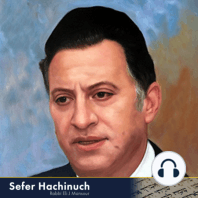20 min listen
Misva #226: Falsely Swearing That One’s Fellow’s Item is Not in His Possession
FromSefer Hachinuch
ratings:
Length:
20 minutes
Released:
Jun 28, 2022
Format:
Podcast episode
Description
The Torah in Parashat Kedoshim (Vayikra 19:11) forbids falsely denying that one does not have his fellow’s item in his possession, such as if he borrowed something or was given something to guard, and falsely denies it, keeping the object for himself (“Lo Techahashu”). In the same verse, the Torah commands, “Lo Teshakeru” (literally, “Do not lie”), which is understood as a command forbidding making such a denial on oath. Thus, if somebody falsely denies having received his fellow’s object to use or to guard, and swears that he did not receive it, he transgresses two prohibitions – one for his false denial, and one for falsely swearing. This prohibition, of course, applies in all times, in all places, and to both men and women. Surprisingly, the Sefer Ha’hinuch writes that one who violates this prohibition, falsely denying on oath that he never received his fellow’s item to guard or use, is liable to Malkut. If witnesses testify that the item in question is in fact in his possession, then he is punished for transgressing this prohibition and falsely swearing that he never received the item. Normally, one is liable to Malkut only if he violates a Biblical prohibition by performing a forbidden act. In this instance, however, the command is transgressed through speech, not by committing any action. Nevertheless, according to the Sefer Ha’hinuch, the violator is liable to Malkut. The Sefer Ha’hinuch explains that this prohibition marks an exception, due to the unique severity of a false oath. This sin is especially grievous, and thus one who swears falsely is liable to Malkut, even though he did not commit an action. Other Rabbis, however, take issue with this position, noting various sources in the Talmud which seem to clearly indicate that Malkut are not administered in such a case.
Released:
Jun 28, 2022
Format:
Podcast episode
Titles in the series (100)
Misva #19: The Prohibition Against Eating Hametz on Pesach: Daily Sefer Hachinuch - Brought to you by itorah.com by Sefer Hachinuch
